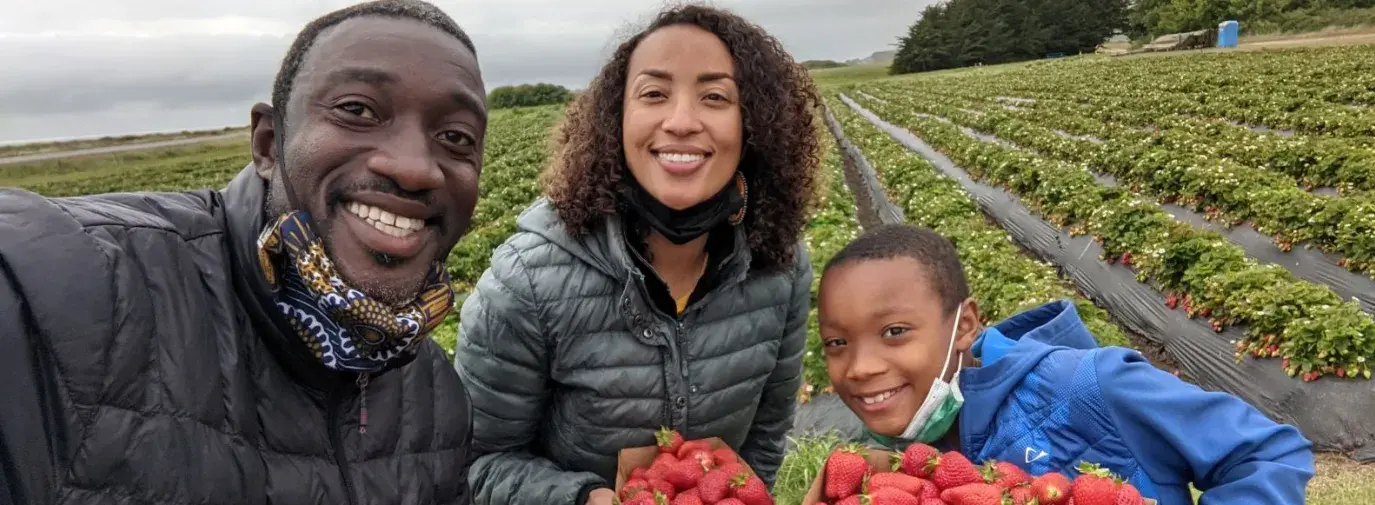
Green Americans imagine a future where all people have enough, communities are healthy and safe, and the abundance of the Earth is preserved for all the generations to come. Responsible entrepreneurs—including a recent spike in African American business owners—are working towards that future now, growing sustainable and inclusive companies that build social impact for their communities, both locally and abroad.
Black Entrepreneurship on the Rise
Over the last few years, entrepreneurship by Black business leaders has boomed.
Many people lost their jobs during the pandemic and were unsure of when their industry would bounce back. Some decided this was the time to become their own boss—new business applications increased more in 2020 than they had in the past 15 years, according to data from the US Census Bureau. Black entrepreneurs accounted for 26% of all new microbusinesses (businesses with ten employees or fewer), up from 15% pre-pandemic.
In 2020, the city of Pittsburgh’s Urban Redevelopment Authority gave out 350 loans—nearly half of which went to Black-owned businesses. This is a huge spike compared to previous years, when 30 to 50 loans a year overall was the average. It’s a trend that is appearing across the country—between February 2020 and August 2021, African American business owners increased 38%, according to research from the University of California, Santa Cruz.
In fact, Black entrepreneurship has doubled since 2019, according to the Small Business Association. There are currently more than 2 million Black-owned small businesses in the US.
Brewing Bold Change
It wasn’t just the pandemic that triggered change for businesses after 2020. The spotlight that the Black Lives Matter movement shone on racial injustice put pressure on corporations. Many of the country’s largest corporations pledged to do better and work toward racial justice and established Black-owned businesses reported experiencing a surge of support after the murder of George Floyd.
African American entrepreneur Margaret Nyamumbo says she noticed the change in 2020, when she says her company’s coffee became the first from a Black-woman-owned business to appear on the shelves at Trader Joe’s. Her direct-trade company, Kahawa 1893, sells African coffee beans grown and harvested by African women producers.
More recently, with the awareness-raising of 2020 receding into the past, Nyamumbo says she has detected a decline in support. She is hopeful that support for Black businesses will become stronger over time, while pointing out that Black communities shouldn’t have to experience trauma for Black-owned businesses to be seen as valuable.
To further build support, Kahawa 1893 participates in the 15% Pledge, an organization working to promote Black-owned brands beyond 2020. The idea is that, since African Americans make up 15% of the population, 15% of shelf space at retailers should be dedicated to Black-owned brands. Macy’s, West Elm, and Nordstrom, and several other large retailers have committed to the pledge, stocking their shelves with Black-owned brands like Kahawa 1893. Green America has supported this pledge via outreach to retailers like CVS and Target who subsequently engaged in dialogue with the 15% Pledge.
Nyamumbo has high hopes for the growth of her business, especially after securing a deal from the sharks on Shark Tank in 2023.

"Respect the drip:" Margaret Nyamumbo (front) with a Kahawa employee serving coffee (in truck). Coffee beans come from a plant that has its origins in ancient forests in East Africa. Kahawa 1893's name combines "kahawa," the Swahili word for "coffee" with the year East Africans began commercially selling coffee into the global market.
The Scoop on Social Impact
Small businesses, including Black-owned businesses, are uniquely positioned to give back to their communities, and may model their business with this in mind. For example, for Nyamumbo, it’s important for Kahawa 1893 to give back to the continent that birthed coffee and the women producers that cultivate it. Every bag of Kahawa coffee has a QR code, which buyers can scan and send tips directly to women coffee producers.
Similarly, Kai Nortey, co-founder of kubé, built an ice cream brand based on her own values and vision for a healthier society. Nortey and her husband are both lactose intolerant, a fate they share with 65% of the US, according to the National Institute of Health. But when looking for dairy-free ice creams on grocery shelves, the Norteys discovered that many of them contain GMOs. So together, they created a creamy vegan ice cream, made from scratch with organic ingredients, so that vegans and lactose-intolerant folks can enjoy ice cream again.
“Kubé is really a story about food justice and the realization of how ‘necessity is the mother of invention,’” says Nortey.
Nortey chooses whole-plant-based foods for kubé's ingredients and refuses to use any chemicals. The coconuts, which are the basis for the full-fat coconut cream in the ice cream, are pressed in-house at a shared commercial kitchen facility. The same can be said for the variety of flavors they offer, from key lime to coffee, which are extracted from organic fruits and plants.
Investing in wholesome ingredients is just as important as investing in people and community for Nortey. In 2023, Nortey hired formerly incarcerated mothers and survivors of domestic violence to make the ice cream, paying $22 an hour.
“Social impact looks like giving people economic opportunities for them to thrive,” says Nortey. Such opportunities are incredibly valuable to the more than 1 million people employed by Black-owned small businesses.
What is more, on average, nearly 53% of dollars spent at a local independent business is recirculated in the local economy, compared to less than 14% at chain stores—that means money you spend at a local independent bookseller is used for employee payroll, which may go to groceries from a local farmers market, and so on, enriching the lives of the everyday American.
For Nortey, not only does that look like hiring locally from underserved populations, but it also means giving to local food producers. Coconut shreds are a byproduct of the production process and are a great addition to soil. Nortey donates coconut shreds to Deep Medicine Circle, a nonprofit with several urban farms, and Planting Justice in east Oakland, which grows food for low-income families.
For now, kubé ice cream can be purchased in California at the Grand Lake Oakland farmers market in the summer months, where you can buy directly from Nortey herself. Kubé ice cream is also stocked on the shelves at Berkeley Bowl West and Mandela Grocery Cooperative in the Bay Area.
Struggles for Black Business Owners
Despite the positive statistics, the United States has a long history of racism that cannot be dismantled in a short time. Kubé has not been spared from this fact.
“A CEO of a popular plant-based food company… asked me if I would work for his company. He offered to pay a high salary to do product development, because I’ve created such a phenomenal product,” recalls Nortey. “And I said, ‘Why don’t you just invest in my company?’ They love what I’m making, and they intentionally choose to try and take what I have … it’s a form of sexism and racism because they think I’m designed to build their empire.”
Systemic racism within financial circles results in inequities for African American customers. Redlined communities remain to this day a result of housing discrimination, where neighborhoods were divided by race when banks denied mortgages to Black homebuyers. When it comes to starting a business, Black borrowers are still rejected at higher rates than white borrowers. Black entrepreneurs therefore often rely on personal savings and funding from family and friends instead of seeking a loan from financial institutions.
For example, in 2018, Nortey and her husband raised over $100,000 to purchase industrial ice cream machines on crowdfundmainstreet.com, a public benefit corporation that shares projects in need of funds from startups. She recommends small businesses raise capital on regulation investment crowdfunding sites like crowdfundmainstreet.com, which attract everyday investors. This option allows Nortey to keep control and leadership of kubé, which wouldn’t happen if the company was bought outright.
One day, Nortey envisions kubé as a storefront, maybe next to another Black-owned restaurant, “where trusted relationships can flourish again, where people can feel dignified and honored because they can finally access vibrant and delicious ice cream that respects their allergies and food restrictions,” she says.
Racial Equity in the Hands of Consumers and Investors
Nortey and Nyamumbo agree that people can best support their companies by purchasing their products. They point to how the original Buy Black movement during the Great Depression worked because it sustained emerging Black businesses when the economy sank. Nortey also states that because building capital is the toughest challenge small businesses face, supporters should consider investing in Black-owned businesses. Take these steps to support and invest in Black entrepreneurship:
Patronize Black-owned businesses: Look for businesses in your community to support! Find more Black-owned businesses from these directories:
- EatOkra.com, for finding Black-owned restaurants.
- BlkGrn.com, for hair- and skin-care products, and wellness and home-cleaning items.
- GetTheBag.biz, for subscription boxes of products from mostly Black-women-owned brands. (GetTheBag recommended Kahawa 1893 and kubé for this article.)
- Coastapp.com/shopblackowned, for Black business directories in Boston, Charlotte, Chicago, Dallas, Los Angeles, New York City, San Francisco, and Seattle.
- Miiriya.com, an app for finding Black-owned fashion, home décor, beauty and hair-care products, and art.
Invest in Black-owned businesses: For as little as $100 or so, crowdfunding sites like crowdfundmainstreet (which helped fund the kubé launch) offer opportunities to invest in startups. That seed money is crucial for Black businesses that are skeptical of lending with banks. Additionally, banking with community development banks and minority depository institutions can help fund Black-owned startups. It’s often part of the mission of these financial institutions to support Black entrepreneurs through low-interest loans and financial resources.
Ask retailers to commit to the 15% pledge: Ask the owners and managers of companies where you shop to increase the representation of Black-owned businesses on their shelves. Call or write to other businesses and take the pledge yourself using 15% Pledge’s consumer commitment guide.
It’s a long road to racial equity in our society and we all have a role to play in lifting up historically marginalized communities. Black business-owners like Nyamumbo and Nortey are doing their part, by helping African farmers reach American markets, and hiring from within marginalized communities. Green Americans can do their part as well, by supporting these and other Black-owned businesses.







